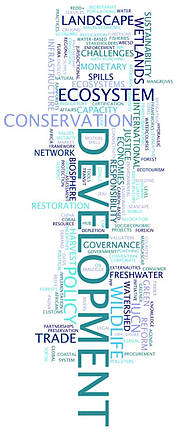Nature+ development - Key messages from the IUCN Congress Forum
10 September 2012 | Article
9 September 2012 - When considering development, there is a tendency to focus on business and industry; however, as seen in the Forum sessions today, if development is to be sustainable, many interdependent sectors must be considered:
Environment-related enterprises are more engaged and accountable
Private enterprises are increasingly more aware of the benefits they derive from nature’s “ecosystem services”. Internalizing the values obtained from these ecosystem services is providing a more robust view of risk (associated with loss or replacement of services) and opportunity (for greater efficiencies and new investments).
Participatory tools and approaches, that include local stakeholders, broaden the benefits of development by fostering greater engagement on environmental issues while contributing directly to poverty reduction.
The impact from development on biodiversity and ecosystems is being addressed in sustainable development frameworks
Business and development both depend on AND impact biodiversity and ecosystem services. However, valuing nature can help businesses manage risk, consider new business opportunities, and make better decisions.
Environmental Best Practice guidelines are available that describe approaches and the many benefits realized from conservation of biodiversity and good stewardship of ecosystems in a variety of sectors. Many have been prepared in partnership with businesses. Today there are also many more opportunities for science-based organizations to contribute, verify and validate baseline data, valuation systems, and mitigation and adaptation techniques related to business and development activities.
Transformation of regulatory frameworks is promoting social equity and fostering green investments
To achieve economic, environmental and social goals, sustainability objectives are changing. New sustainability indicators are being developed for policy instruments that are connected to policy decisions in all areas. Policy reforms are reducing inequities and leading to increasing investments in conservation of biodiversity and environmental stewardship.
Environmental good-practice standards are being developed and applied by sector-based trade associations and partnerships. Sensitivity to human requirements is being integrated into regulatory frameworks, along with greater accountability in the private sector.
Biodiversity and business are learning each other’s language
The environmental community has a better understanding of the motivations and “language” of the business world. Likewise, the business community is gaining a deeper knowledge of the environment and social systems on which they depend. This understanding is providing a foundation for partnerships between the environmental and development sectors.
Businesses are investing more in training employees about the importance of biodiversity and the relationship it has with human health. At the same time the critical role ecosystem services play in contributing to the success of businesses from small local enterprises to multinational industries is far better understood today.
"When you talk about conservation, think about conserving the whole web of life" - Aseem Shrivastava





